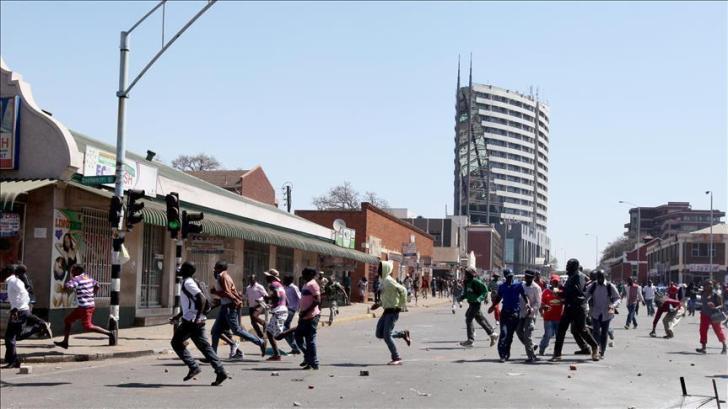News / National
ZPP raises alarm over human rights violations
15 Apr 2025 at 08:35hrs | Views

The Zimbabwe Peace Project (ZPP), a prominent human rights watchdog, has reported that more than 1,000 Zimbabweans experienced violations of their fundamental freedoms in the wake of the March 31 protests against President Emmerson Mnangagwa. The organization has accused state authorities of orchestrating a crackdown aimed at suppressing dissent and criminalizing peaceful political expression.
The demonstrations, held at Harare's Freedom Square, were sparked by Blessed Geza, a former Zanu-PF Central Committee member and war veteran, who has since gone into hiding. Using his social media platforms, including X (formerly Twitter) and YouTube, Geza called for nationwide protests demanding Mnangagwa's resignation, citing allegations of corruption, nepotism, tribalism, and attempts to extend his term beyond the constitutional limit of 2028.
Despite heavy police presence, over 100 demonstrators gathered in defiance. Tensions escalated when protesters barricaded parts of Rotten Row and Robert Mugabe Roads, disrupting traffic and prompting a forceful response by law enforcement, who used tear gas and made mass arrests.
According to ZPP's first-quarter report for 2025, the State's response led to 98 arrests, all of whom remain in custody at Harare Remand Prison after being denied bail. The report details a broader pattern of abuse surrounding the protest, highlighting 24 violations of freedom of assembly and association affecting 740 people, as well as 15 violations of freedom of expression impacting 146 individuals. The organization also documented 14 assault incidents involving 68 citizens.
"The Zimbabwe Peace Project recorded a disturbing surge in rights violations directly linked to the March 31 protests," the report states. "These included assaults, arbitrary arrests, and intimidation - actions designed to silence dissent and discourage future civic participation."
The ZPP accused the government of orchestrating a preemptive crackdown by deploying security forces in communities to intimidate potential protesters, surveil online spaces, and arrest activists. The watchdog described the clampdown as part of a "state-led strategy" to erode constitutionally guaranteed rights such as freedom of expression, peaceful assembly, and political participation.
"In anticipation of the protests, security forces were deployed to pre-emptively intimidate citizens, arrest activists, and surveil communities, while online spaces were policed to silence dissent," the report noted. "The arrest of 98 Zimbabweans in Harare alone, solely for participating in the March 31st protests, exemplifies the criminalisation of protest."
The ZPP further criticized the judiciary's role in perpetuating fear, warning that the continued use of legal instruments to detain peaceful demonstrators places immense psychological and financial strain on families and threatens the broader democratic fabric of the country.
"These actions point to an entrenched culture of weaponisation of the judiciary and criminal law to punish human rights defenders," the report warned. "The impact on human rights is a severe dismantling of freedom of expression, eroding public trust in institutions, and deterring peaceful participation in democratic processes."
ZPP concluded with a stern warning: without urgent structural reforms and genuine accountability, Zimbabwe risks becoming a state in which fear replaces freedom, and where dissent is punished instead of protected.
The demonstrations, held at Harare's Freedom Square, were sparked by Blessed Geza, a former Zanu-PF Central Committee member and war veteran, who has since gone into hiding. Using his social media platforms, including X (formerly Twitter) and YouTube, Geza called for nationwide protests demanding Mnangagwa's resignation, citing allegations of corruption, nepotism, tribalism, and attempts to extend his term beyond the constitutional limit of 2028.
Despite heavy police presence, over 100 demonstrators gathered in defiance. Tensions escalated when protesters barricaded parts of Rotten Row and Robert Mugabe Roads, disrupting traffic and prompting a forceful response by law enforcement, who used tear gas and made mass arrests.
According to ZPP's first-quarter report for 2025, the State's response led to 98 arrests, all of whom remain in custody at Harare Remand Prison after being denied bail. The report details a broader pattern of abuse surrounding the protest, highlighting 24 violations of freedom of assembly and association affecting 740 people, as well as 15 violations of freedom of expression impacting 146 individuals. The organization also documented 14 assault incidents involving 68 citizens.
"The Zimbabwe Peace Project recorded a disturbing surge in rights violations directly linked to the March 31 protests," the report states. "These included assaults, arbitrary arrests, and intimidation - actions designed to silence dissent and discourage future civic participation."
The ZPP accused the government of orchestrating a preemptive crackdown by deploying security forces in communities to intimidate potential protesters, surveil online spaces, and arrest activists. The watchdog described the clampdown as part of a "state-led strategy" to erode constitutionally guaranteed rights such as freedom of expression, peaceful assembly, and political participation.
"In anticipation of the protests, security forces were deployed to pre-emptively intimidate citizens, arrest activists, and surveil communities, while online spaces were policed to silence dissent," the report noted. "The arrest of 98 Zimbabweans in Harare alone, solely for participating in the March 31st protests, exemplifies the criminalisation of protest."
The ZPP further criticized the judiciary's role in perpetuating fear, warning that the continued use of legal instruments to detain peaceful demonstrators places immense psychological and financial strain on families and threatens the broader democratic fabric of the country.
"These actions point to an entrenched culture of weaponisation of the judiciary and criminal law to punish human rights defenders," the report warned. "The impact on human rights is a severe dismantling of freedom of expression, eroding public trust in institutions, and deterring peaceful participation in democratic processes."
ZPP concluded with a stern warning: without urgent structural reforms and genuine accountability, Zimbabwe risks becoming a state in which fear replaces freedom, and where dissent is punished instead of protected.
Source - NewZimbabwe



























